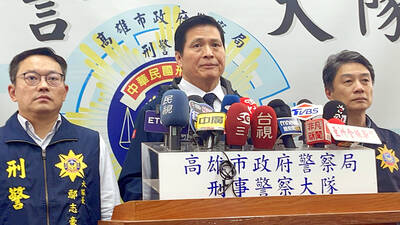The heads of Taiwan's five government branches yesterday reached a consensus in three areas, including the establishment of a communications platform to resolve disagreements, after attending a meeting led by President William Lai (賴清德).
Speaking after the meeting, Presidential Office Secretary-General Pan Men-an (潘孟安) said the five branch heads agreed to set up a platform to improve communications and cooperation to enable them to advance public policies and reinforce Taiwan's democracy and freedom.

Photo: CNA
They also agreed that the five branches of government — the Executive Yuan, Legislative Yuan, Judicial Yuan, Examination Yuan and Control Yuan — all have their own duties and checks and balances, but still need to respect each other.
The five branch heads also believed that competition among political parties is allowed, but that the nation cannot be sacrificed by their competition, as Taiwan is faced with a fast-changing world.
They felt that the five branches needed to unite, in particular on national defense and diplomatic issues by prioritizing national security, Pan said.
The meeting was called by Lai to discuss issues related to Taiwan and the severe political and economic challenges it faces at home and abroad.
More specifically, it was focused on the stand-off between Lai's Democratic Progressive Party (DPP) government and the Legislative Yuan, in which the opposition Chinese Nationalist Party (KMT) and Taiwan People's Party (TPP) have teamed up to pass measures strongly opposed by the DPP.
Most recently, the two sides have battled over the central government's budget.
The KMT and TPP have cut or froze some of the DPP's budget request, but still allowed the overall budget to grow by about 3 percent compared with last year.
However, the DPP has argued that the cuts would make it hard for it to carry out its policies.
After the meeting, Pan said national security, economic development and caring for the people cannot be compromised and represent the responsibilities and goals that the ruling and opposition parties should pursue together.
Both the ruling and opposition parties should put people in the country first, and therefore the five branches should work together to boost the local economy and strengthen industrial development to protect public welfare, he said.
How those principles would lead to conciliation between the different sides was unclear, given that Legislative Speaker Han Kuo-yu (韓國瑜) is the only head of the five branches aligned with the opposition, and his post does not involve policymaking.
The confrontation in the Legislative Yuan has led to a massive campaign initiated by DPP caucus whip Ker Chien-ming (柯建銘) to recall KMT lawmakers, and the KMT decided to retaliate.
After the meeting, Han hoped Lai would urge the ruling and opposition camps to stop their recall campaigns.
He also called on the Cabinet not to ask the Legislative Yuan to vote a second time on the general budget plan once it is submitted to the government, but said the legislature was willing to hold cross-party negotiations to find a solution to parts of the budget the Executive Yuan has claimed it would have trouble implementing.

Twenty-four Republican members of the US House of Representatives yesterday introduced a concurrent resolution calling on the US government to abolish the “one China” policy and restore formal diplomatic relations with Taiwan. Led by US representatives Tom Tiffany and Scott Perry, the resolution calls for not only re-establishing formal relations, but also urges the US Trade Representative to negotiate a free-trade agreement (FTA) with Taiwan and for US officials to advocate for Taiwan’s full membership in the UN and other international organizations. In a news release announcing the resolution, Tiffany, who represents a Wisconsin district, called the “one China” policy “outdated, counterproductive

Actress Barbie Hsu (徐熙媛) has “returned home” to Taiwan, and there are no plans to hold a funeral for the TV star who died in Japan from influenza- induced pneumonia, her family said in a statement Wednesday night. The statement was released after local media outlets reported that Barbie Hsu’s ashes were brought back Taiwan on board a private jet, which arrived at Taipei Songshan Airport around 3 p.m. on Wednesday. To the reporters waiting at the airport, the statement issued by the family read “(we) appreciate friends working in the media for waiting in the cold weather.” “She has safely returned home.

ON PAROLE: The 73-year-old suspect has a criminal record of rape committed when he was serving in the military, as well as robbery and theft, police said The Kaohsiung District Court yesterday approved the detention of a 73-year-old man for allegedly murdering three women. The suspect, surnamed Chang (張), was arrested on Wednesday evening in connection with the death of a 71-year-old woman surnamed Chao (趙). The Kaohsiung City Police Department yesterday also unveiled the identities of two other possible victims in the serial killing case, a 75-year-old woman surnamed Huang (黃), the suspect’s sister-in-law, and a 75-year-old woman surnamed Chang (張), who is not related to the suspect. The case came to light when Chao disappeared after taking the suspect back to his residence on Sunday. Police, upon reviewing CCTV

TRUMP ERA: The change has sparked speculation on whether it was related to the new US president’s plan to dismiss more than 1,000 Joe Biden-era appointees The US government has declined to comment on a post that indicated the departure of Laura Rosenberger as chair of the American Institute in Taiwan (AIT). Neither the US Department of State nor the AIT has responded to the Central News Agency’s questions on the matter, after Rosenberger was listed as a former chair on the AIT’s official Web site, with her tenure marked as 2023 to this year. US officials have said previously that they usually do not comment on personnel changes within the government. Rosenberger was appointed head of the AIT in 2023, during the administration of former US president Joe